Under the Fig Trees
Erige Sehiri’s remarkable feature debut focuses on life in rural Tunisia.
Until now the career of the French-Tunisian filmmaker Erige Sehiri has been devoted to documentaries, most of them shorts. That background strongly influences Under the Fig Trees her first work with actors but cast in a way which means that the players are non-professionals enacting roles that are very close to their own experiences. The film that has resulted is highly unusual both in its nature and its character and, being a piece that is virtually plotless, it may not appeal to all. But for my own part I found it strikingly original and appealing.
What Sehiri has done is to portray one typical day amongst workers picking figs in the countryside of north west Tunisia. We meet their boss, Saber (Fedi Ben Achour), his foreman Gaith (Gaith Mendassi) and the man who owns the land where this operation takes place (Anter Maarzouk). However, the majority of those seen here are the workers themselves. They include two elderly women, Leila (Leila Ouhebi) and Hneya (Hneya Ben Elhedi Sbahi), but most of them are youngsters including a significant number of females. The film starts at dawn as they are driven to the site and it closes with their departure at the end of the day.
In time a number of characters come into focus. Among them are 17-year-old Melek (Feten Fdhili) who encounters Abdou (Abdelhak Mrabti), the boy she had favoured way back and who is now returning to this area (the landowner is, indeed, his uncle). Then there’s Sana (Amen Fdhili) who takes a romantic view of life and persuades herself that she could make her boyfriend, Firas (Firas Amri) more reliable. No less central is Melek’s older sister, Fide (Fide Fdhili) who is ready to play up to boss man Saber, but who is the most assertive of the group and lives life very much on her own terms.
Described in this way Under the Fig Trees might sound to be a relatively conventional film in which a number of story threads are brought together and intertwined. But that is not how it plays. The impression that we get is of a film that is eavesdropping on life itself. We even get snatches of dialogue that are not developed and characters whom we only gradually come to recognise. At times Sehiri chooses to show an image with a number of people in it but makes no effort to identify whose voice it is that accompanies the shot. Involvement comes through the frequent use of close shots despite the fact that this is a wide screen film: the faces and the atmosphere draw us in and we feel part of this place. Nevertheless, what is achieved is to suggest that the lives of the pickers should be seen as a microcosm of a much wider world. That comes through in the class structure inherent (the landowner/the employers/the workers) and in the contrasts that emerge from the varying outlooks of the characters and the attitudes that stem from being male or female. The prime focus here is on the women and that makes all the more effective a moment when just for once we have a scene between Saber and Gaith which is fully expressive of a male outlook.
I should mention that the generalisation of the approach which delays the clear identification of the individual figures could be found off-putting and that I welcomed the fact that the version of the film which I saw carried subtitles which extended to naming the character who was speaking. But from the start the players are splendidly convincing and that is an enormous aid in rendering engaging a work which, despite occasional more dramatic moments, asks the viewer to feel part and parcel of a study of everyday life. It may not amount to a film of huge importance, but Under the Fig Trees is not quite like any other film and its individuality and human appeal make it memorable.
Original title: Taht alshajra.
MANSEL STIMPSON
Cast: Ameni Fdhili, Fide Fdhili, Feten Fdhili, Abdelhak Mrabti, Fedi Ben Achour, Gaith Mendassi, Leila Ouhebi, Firas Amri, Samar Sifi, Hneya Ben Elhedi Sbahi, Anter Maarzouk.
Dir Erige Sehiri, Pro Erige Sehiri, Didar Domehtri and Palmyre Badinier, Screenplay Erige Sehiri, Ghalya Lacroix and Peggy Hamann, Ph Frida Marzouk, Ed Ghalya Lacroix, Hafedh Laaridhi and Malek Kammoun, Music Amina Bouhafa, Costumes Nabila Cherif.
Henia Production/Maneki Films/Akka Films/In Good Company/Rai Cinema-Modern Films.
97 mins. Tunisia/France/Switzerland/Germany/Qatar. 2021. UK Rel: 19 May 2023. Cert. 12A.


